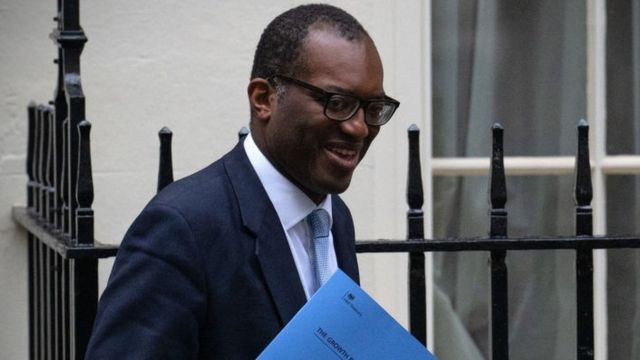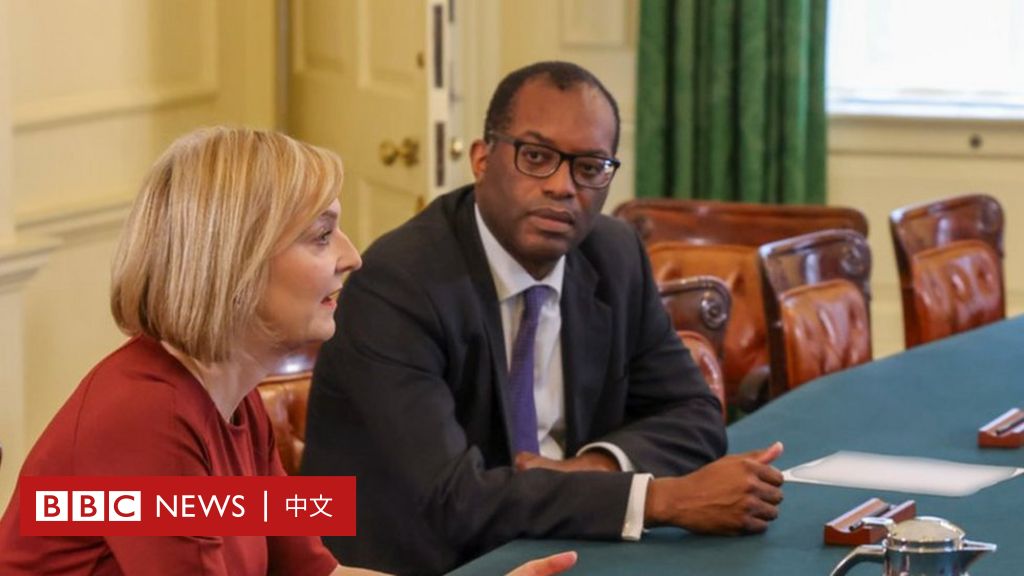September 24, 2022
image source,Number 10
—
Kwarten and Prime Minister Truss
–
British Chancellor of the Exchequer Kwasi Kwarteng announced the country’s most aggressive tax cut in nearly 50 years, calling it a “new era” for the British economy.
–
The plan includes the abolition of the maximum rate of income tax, which applies only to high-income workers, and the lowering of income tax and stamp duty on home ownership, while the previous plans to raise corporate income tax will be suspended.
–
Kwarten said the UK needs a major political shift to spur economic growth.
–
But the opposition Labor Party said the biggest tax cut since the 1970s would not solve Britain’s current cost of living crisis and was a “plan to reward the rich”.
–
But Kwarten insisted his tax cut plan was “fair”.
–
The tax cuts came when the Bank of England warned that Britain may already be in a recession.
–
The pound plunged to a new 37-year low against the dollar when the Chancellor of the Exchequer gave a speech announcing the package.
–

image source,Getty Images
—
Kwarten
–
Kwarten, who ditched the economic policies of former Prime Minister Boris Johnson, scrapped plans to raise taxes to pay for public services, aiming to stimulate economic growth.
–
In presenting the plan, known as a “mini-budget”, to the House of Commons, Kwarten said the high tax rates “undermined the UK’s competitiveness” by reducing incentives for jobs and business investment.
–
It announced that the basic income tax would be reduced by one percentage point in April to 19%, a year ahead of schedule.
–
It also announced that the top income tax rate will be reduced to 40% from 45%, meaning the UK will only have a higher rate as of April.
–
To an unexpected extent, the maximum tax rate of 45% for those earning more than £ 150,000 per year will be abolished.
–
Income tax cuts and a national insurance withdrawal will allow higher income earners to save more.
–
- The stamp duty threshold for people in England and Northern Ireland needs to be raised to £ 250,000
–
- The threshold for first time buyers will be increased to £ 425,000, while they can claim tax relief on the value of the property
–
It will also be increased from £ 500,000 to £ 625,000
–
- Expected increase in taxes on beer, cider, wine and spirits to be demolished
–
- The bankers’ bonus cap must be withdrawn
–
- New investment zones will be established where businesses will benefit from tax breaks and relaxation of planning restrictions to encourage real estate construction
–
Kwarten fulfilled his promise to withdraw from Johnson’s increased national insurance payments.
–
He also confirmed that plans to raise corporate income tax from 19% to 25% would also be scrapped.
–
The tax cuts announced by Kwarten are expected to amount to nearly £ 45 billion in spending by 2027. The chancellor said this “would turn a vicious cycle of stagnation into a virtuous cycle of growth”.
–
“We need a new approach in a new era, focused on growth,” he said.
–
According to the British Treasury, the public debt will increase by 72 billion pounds after the announcement of the plan.
–
Income tax changes don’t apply to Scotland, but corporate tax and national insurance cuts are across the UK.
–
“Big bet”
Paul Johnson, director of the independent Institute for Fiscal Studies, said the package was the largest tax cut since the 1972 Budget, a cut 50% higher than expected.
–
To achieve these measures, the UK could borrow £ 120bn over three years, he said.
–
Paul Johnson also said the plan was a “big gamble”, with the money poured into an economy with still high inflation. However, he said these would be “manageable” if economic growth “could really keep up”.
–
—————————————————————————
–
Analysis – BBC Political Affairs Correspondent Nick Eardley
This is not a mini budget. This is an economic intervention with a radical cut in taxes and an important adjustment of the program.
–
Boris Johnton’s tax plan has been discharged. Many families will save some money, but some of the biggest tax breaks will go to those with the highest wages.
–
And this will cost a lot of money.
–
In the Chancellor’s abacus, it’s worth it. People need help paying their bills, and tax cuts will spur growth. If the economy is stimulated, there will be more taxes, and thus this will help pay off the debt in the medium term.
–
But many doubt it will work.
–
Senior conservatives have warned for months that the strategy is wrong and will leave future generations in debt.
–
Opposition parties argue that the government’s prioritization errors in tax cuts for the rich should be financed by unexpected taxes on the profits of energy companies.
–
The Treasury Department did not say when it expects to reach its economic growth target.
–
But the chancellor is determined to bring about the radical change in policy. The big question is: will it work?
–
—————————————————————————
–
Labor described Kwarten’s speech as “a 12-year admission of economic failure”.
–
“Conservatives can’t solve the cost of living crisis, conservatives are the cost of the life crisis and our country can no longer bear them,” said shadow chancellor Rachel Reeves.
–
“The Chancellor of the Exchequer showed today what his priorities are. This is not a growth plan, it is a plan to reward the rich. It is a return to the cascading economy of the past, a regression for the future, not a brave one. new era.”
–
Lib-dem leader Ed Davey said, “This is a billion dollar budget that shows the Conservative Party is completely out of touch with families struggling to pay the bills.”
–
Recession is not “inevitable”
When the tax cuts were announced, the financial markets reacted immediately, with the pound sterling and the UK stock market falling.
–
However, Kwarten said his tax cuts were “fair” across all income brackets.
–
“I don’t think it’s a gamble at all,” the chancellor said in an interview with BBC Political Affairs Director Chris Mason.
–
“In my opinion, sticking to the original line is a gamble.”
–
He insisted that it would be riskier not to cut taxes and continue in the direction of former Prime Minister Boris Johnson.
–
“So what we have to do is start over, reconsider,” Kwarten said.
–
Responding to Labor criticism, he said the “mini-budget” was not an admission of defeat and that the recession predicted by the Bank of England “was not inevitable”.
–
But, he said, “We also recognize that we can do better.”
–
He said the tax cuts, the scrapping of plans to increase national insurance and support for household energy bills “will help the most vulnerable in society get through a difficult time.”
–
Asked if the UK economy was in recession, Kwarten said that despite the Bank of England’s description, he believed that even if there was a recession, it would be small and hoped that “we will recover and grow”.
–
When pressed, he refused to confirm whether the UK economy was in recession.
–
annual economic forecast
The package also includes details of some of the government’s plans to limit household and business energy bills.
–
Costs in these budgets are “particularly uncertain” due to volatility in energy prices, but at recent prices, the package is expected to total around $ 600 in six months from October, Kwarten said, about £ 100 million.
–
“We expect spending to decrease as new long-term energy contracts are negotiated with suppliers,” he said.
–
The government usually publishes independent forecasts to reflect the economic impact of large tax adjustments, but Kwarten chose not to because his speech is procedurally not a budget.
–
But Kwarten promised that the Office for Budget Responsibility would release a full economic forecast later this year, with a second one in the new year.
–
The sharp rise in Treasuries comes at a time when inflation is at its 40-year high, increasing interest payments.
–
On Thursday, the Bank of England raised interest rates to 2.25% from 1.75% – the highest in 14 years – in an effort to cool prices.
—


